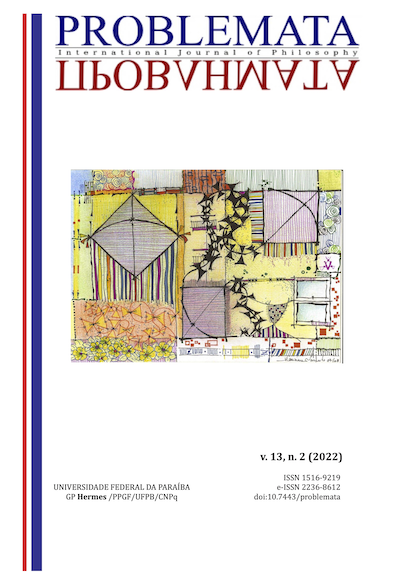"RACE-ISM":
THE PSEUDO IDEA THAT EXTERMINATES THE BLACK POPULATION
DOI:
https://doi.org/10.7443/problemata.v13i2.62814Keywords:
Racism, Victim, Other, Responsibility, JusticeAbstract
This paper aims to analyze race-ism as a pseudo-idea that exterminates the black population. Thus, the text intends to put on canvas the issue of language used as a promoter of categorization that softens the domination of the other and, consequently, justifies the violation of the concrete subject. The subjectivation of this concrete subject provides a distancing from the concrete reality, where the other is faced under the bias of the dominating and rational discourse of Western thought. When it is stated that the concept of race is insufficient, this implies that one must reject the relationship culturally built on the opposition of the concepts of "black" and "white". Understanding the construction process of the concept of race is fundamental to the deconstruction of the discriminatory apparatus that has been in place since Europe, which qualifies race based on skin pigmentation. The issue of violence against the black population cannot be faced only based on color, but it is a political and social issue. Black men and women are victims of a system that has its references in Eurocentricity, which despises the expressiveness of the otherness of the face and marginalizes appearance as a face formatted by exclusion. In this sense, it is necessary to address the scope of racism under political, ethical, and economic aspects, so as to promote justice for the victims of the system that is previously thought to exclude and dominate.
Downloads
References
DUSSEL, Enrique. O encobrimento do outro. Petrópolis: Vozes, 1993.
DUSSEL, Enrique. Para uma ética da libertação latino-americana. 1. Acesso ao ponto de partida da ética. São Paulo: Loyola, 1977a.
FERNANDES, F. A integração do negro na sociedade de classes. 3. ed. São Paulo: Ática, 1978.
HUTCHENS, B. C. Compreende Lévinas. Tradução de Vera Lúcia Mello Joscelyne. Petrópolis: Vozes, 2007.
LEVINAS, Emmanuel. Difficult freedom: essays on judaism. Trad. Seán Hand. Baltimore, The Johns Hopkins University Press, 1990.
LEVINAS, Emmanuel. Entre nós: ensaios sobre a alteridade. Petrópolis: Vozes, 1991.
LEVINAS, Emmanuel. Totalidade e infinito: ensaio sobre a exterioridade. Tradução de José Pinto Ribeiro, Lisboa: Edições 70, 1980.
MOURA, C. Sociologia do negro no Brasil. São Paulo: Ática, 1988.
NASH, T. P. Relendo raça, bíblia e religião. Centro de Estudos Bíblicos. São Leopoldo: Con-Texto, 2005.
RUIZ, C. M. B. Justiça e memória: para uma crítica ética da violência. São Leopoldo: Unisinos, 2009.
SOLE, Joan. Levinas: la ética del otro. Barcelona: Batiscafo, 2015.
SANTOS, Ivair Augusto Alves dos. Direitos humanos uma nova abordagem na luta antirracista. Disponível em: https://www.ueangola.com/criticas-e-ensaios/item/1256-direitos-humanos-uma-nova-abordagem-na-luta-antirracista. Acesso em: 17 de out. 2021.
TOURNIER, Michel. Sexta-feira ou a vida selvagem. Tradução de Emílio Campos Lima. 50 ed. Queluz de Baixo, Portugal: Editorial Presença, 2000.
Downloads
Published
Issue
Section
License
Copyright (c) 2022 José Rodrigo Gomes de Sousa, Gedeon José de Oliveira, Iraquitan de Oliveira Caminha

This work is licensed under a Creative Commons Attribution 4.0 International License.
Authors who publish with this journal agree to the following terms:
- Authors retain copyright and grant the journal right of first publication with the work simultaneously licensed under a Creative Commons Attribution License that allows others to share the work with an acknowledgement of the work's authorship and initial publication in this journal.
- Authors are able to enter into separate, additional contractual arrangements for the non-exclusive distribution of the journal's published version of the work (e.g., post it to an institutional repository or publish it in a book), with an acknowledgement of its initial publication in this journal.
-
- Authors are permitted and encouraged to post their work online (e.g., in institutional repositories or on their website) prior to and during the submission process, as it can lead to productive exchanges, as well as earlier and greater citation of published work (See The Effect of Open Access).





